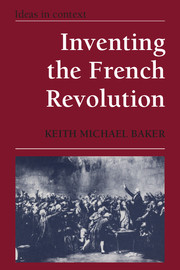Book contents
- Frontmatter
- Contents
- Acknowledgments
- Introduction
- 1 On the problem of the ideological origins of the French Revolution
- Part I French history at issue
- Part II The language of politics at the end of the Old Regime
- 5 French political thought at the accession of Louis XVI
- 6 A classical republican in eighteenth-century Bordeaux: Guillaume-Joseph Saige
- 7 Science and politics at the end of the Old Regime
- 8 Public opinion as political invention
- Part III Toward a revolutionary lexicon
- Notes
- Index
8 - Public opinion as political invention
Published online by Cambridge University Press: 05 June 2012
- Frontmatter
- Contents
- Acknowledgments
- Introduction
- 1 On the problem of the ideological origins of the French Revolution
- Part I French history at issue
- Part II The language of politics at the end of the Old Regime
- 5 French political thought at the accession of Louis XVI
- 6 A classical republican in eighteenth-century Bordeaux: Guillaume-Joseph Saige
- 7 Science and politics at the end of the Old Regime
- 8 Public opinion as political invention
- Part III Toward a revolutionary lexicon
- Notes
- Index
Summary
The theme of this essay can be presented quite simply. Turn to the eleventh volume of the Encyclopédie, published in 1765. Look up the article “Opinion.” There you will find the traditional rationalist distinction between rational knowledge and uncertain opinion vividly illustrated by a metaphor contrasting the full, clear light of the midday sun with the flickering, feeble glow of a torch in the darkness. “Rational knowledge [la science] is a full and entire light, which reveals things clearly, shedding demonstrable certainty upon them; opinion is but a feeble and imperfect light, which reveals things only by conjecture and leaves them always in uncertainty and doubt.” Appearing as it does in a work constructed along the fault lines in the rationalist theory of knowledge upon which the traditional distinction between knowledge and opinion depended, this article surprises only by its utter conventionality. In fact, its conception of opinion is precisely the same as that underlying the vast compendium of conventional wisdom on the matter compiled in 1735 by the marquis de Saint Aubin under the title Traité de l'opinion, ou Mémoires pour servir à l'histoire de l'esprit humain, a treatise which concludes its contemplation of the variability of opinion, predictably enough, with a Hobbesian argument for absolute monarchy.
The matter becomes more interesting, though, if one turns to the Encyclopédie méthodique and again looks up the term opinion. The first thing one finds is that the original article has simply disappeared.
- Type
- Chapter
- Information
- Inventing the French RevolutionEssays on French Political Culture in the Eighteenth Century, pp. 167 - 200Publisher: Cambridge University PressPrint publication year: 1990
- 13
- Cited by



